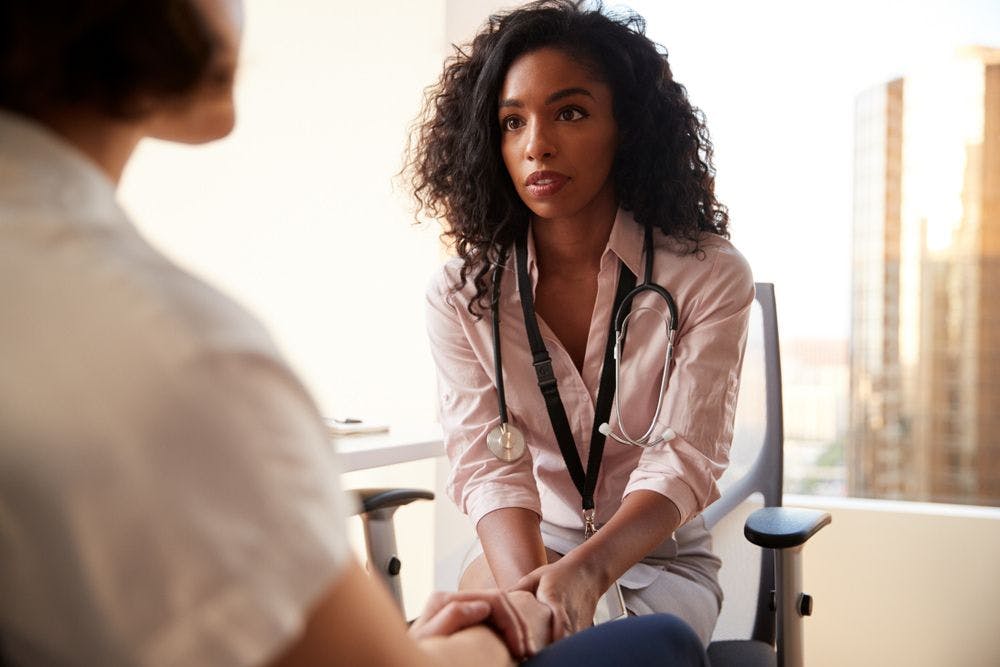Here’s how you can shape the future of women’s health
updated on May 21, 2021

From empowering, supportive experiences to times when healthcare providers have missed the mark, now is the opportunity to share your experiences in the Government's call for evidence
Have you ever come out of an appointment with a medical professional feeling unheard and defeated? According to a study from The Eve Appeal, you wouldn't be alone.
The study found that many women do not feel listened to during appointments to do with their reproductive health, with 23% reporting that they felt they weren’t being taken seriously, and 20% feeling they were raising a ‘trivial issue’.
The findings are accompanied by further evidence that, elsewhere in women’s healthcare, patients were falling through the gaps. In the UK, women have a longer life expectancy than men, however, women spend a great proportion of their lives in ill health and disability. Additionally, while men’s average life expectancy is remaining stable, women’s is falling.
“For generations, women have lived with a health and care system that is mostly designed by men, for men,” says Matt Hancock, Secretary of State for Health and Social Care. “This has meant that not enough is known about conditions that only affect women, or about how conditions that affect both men and women impact women in different ways. Pregnant women and women of childbearing age are also under-represented in clinical trials, which can create troubling gaps in data and understanding.
“This problem affects half of our population. It can lead to poorer advice and diagnosis and, as a result, worse outcomes. Symptoms can often differ between men and women, and studies show some conditions, like coronary blockages, are more likely to be misdiagnosed among women than men.”

Emily’s story
When Emily Simmonds tried to access support for an eating disorder, her journey was disrupted by a service that was not able to meet her needs.
“Anorexia, or ‘Ana’ as she became known in our household, crept into my life at a point in my teenage years when things began to spiral out of control. A combination of exam anxiety, insomnia and the passing of a beloved dance teacher were the elements of a perfect storm,” Emily says.
“I was under the grip of anorexia for six long years. In that time, I battled depression (a bi-product of having an eating disorder), suicidal thoughts and was hospitalised multiple times. At my worst, I was fed through a tube in my nose which gave me the calories that I needed to stay alive. This was just before my 18th birthday.
“Throughout my illness, I received excellent support from the NHS and through private funding. Alongside the constant presence of family and friends, this support no doubt helped with my recovery. However, there were some significant obstacles along the way in my treatment that unfortunately made things worse.
“Firstly, securing a hospital bed was like trying to find a needle in a hay-stack. My father would spend all day, every day, on the phone to hospitals, quite literally begging for a bed for a daughter who was trying her best to starve herself to death.
“Secondly, I was frequently told by psychiatrists and GPs that my weight wasn’t low enough for the inpatient care I desperately needed. Telling a sufferer with an already distorted view of health and their body that they aren’t thin enough is almost like telling them they are obese. It gives ‘Ana’ the ammunition she needs to grow stronger and deadlier. In my case, it drove me to a BMI so low that I was classed as being ‘in danger of mortality.’
“To be clear, this isn’t the fault of any single doctor or professional, but it’s the result of a seemingly broken and underfunded healthcare system that simply doesn’t have the facilities or resources to help those in need. And perhaps it’s a system that still doesn’t quite understand the strength of this brutal enemy or appreciate the severe consequences of not treating it early enough.
“With eating disorders’ rates higher than ever, affecting girls as young as 9 years old, I strongly believe that the focus and attention needs to be on the healthcare system. This is a silent pandemic that is destroying lives of both sufferers and their carers, and we need to do more to put a stop to it. The sooner the better.”
Now is the time for change, and the open consultation Women’s Health Strategy: Call for Evidence is an opportunity to share you experience, and help shape the future of healthcare.
Positive or negative, capturing moments where you have felt supported and empowered and also those where you have felt let down, ignored, or excluded, the experiences shared will help shape the Women’s Health Strategy.
“We know that damaging taboos and stigmas remain around many areas of women’s health, which can prevent women from starting conversations about their health or seeking support for a health issue,” says Nadine Dorries, Minister of State for Mental Health, Suicide Prevention and Patient Safety.
“When women do speak about their health, all too often, they are not listened to. Independent reports and inquiries – not least the First do no harm report and the Paterson Inquiry report – have found that it is often women who the healthcare system fails to keep safe and fails to listen to. We absolutely must change this.”
It is Nadine’s hope that the experiences shared in the Call for Evidence will help the Government establish women’s priorities, and lead to change within the system.
Share your experience by visiting gov.uk
Want to speak to a counsellor? Connect with a professional using counselling-directory.org.uk

